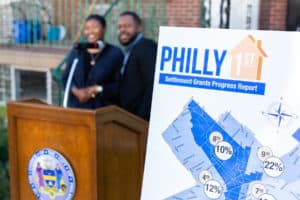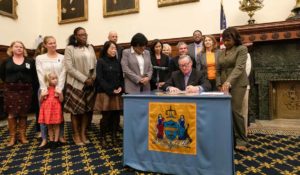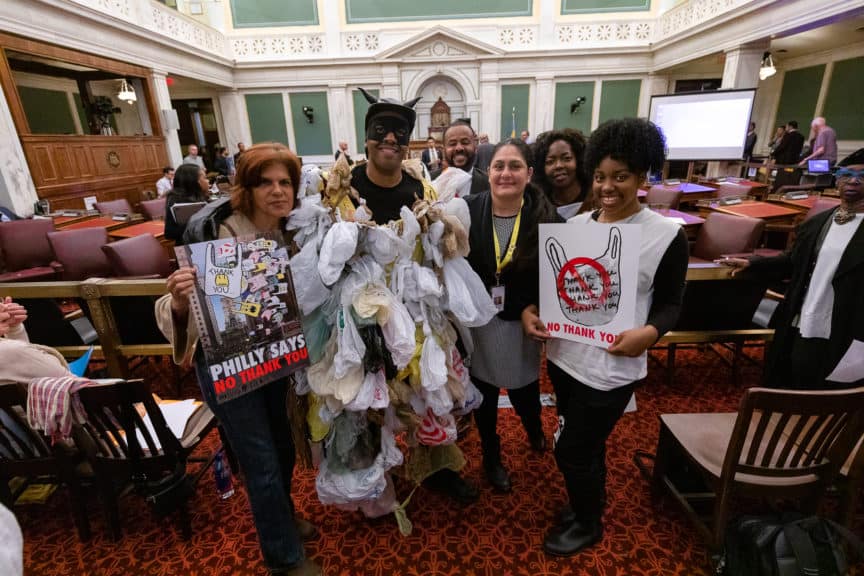Plastic Bag Ban Advances Out of Committee
Neighborhood blight can take many forms – trash and debris from unkempt properties piling up on sidewalks, plastic bags from stores swirling around like raggedy balloons, and even shopping carts taken off store parking lots and left abandoned throughout communities.
Council members hear about blight from their constituents every day, and they’re confronting it on several innovative fronts in Council.
Councilmember Mark Squilla’s (1st District) proposed ordinance that would ban the use of those ubiquitous plastic bags moved through a Council committee following a hearing this week, and it received first reading in Council yesterday.
The committee vote midweek came after Squilla executed a compromise and removed a proposed 15-cent fee for customers using paper bags. That move was st the request of Councilmember Maria Quinones Sanchez (7th District), who chairs the Licenses and Inspections Committee and criticized the fee as harmful to low-income residents. “I’m against any regressive tax and any fee to poor people, particularly in food deserts,” Quinones Sanchez said.
Squilla stayed focused on the broader environmental good of the plastic bag prohibition, noting “Everybody’s in the same boat on getting rid of single-use plastics.”
The bill is the fourth time a plastic bag ban has been tried in Council, dating to 2007. The Kenney administration is saying it supports the bill, which is now up for final passage next week.
The plastics industry, which has opposed similar bag bans across the country, did not testify against the bill. But an array of neighborhood anti-blight advocates did, including Charito Morales, a North Philadelphia woman, who vividly described the problem in her community. “We have more plastic bags flying over my neighborhood than birds,” she said.
Activist and Mural Arts volunteer Ronald Whyte, came to the hearing dressed in a costume made of 365 plastic bags, which he said is the amount of bags each city resident uses each year. Watch his testimony:
New Bill Would Require Food Markets, Retail Stores to Better Their Control Shopping Carts
Meanwhile, Councilmember Cherelle Parker (9th District) introduced legislation Thursday that would require stores that provide shopping carts to have better systems in place to monitor and control the carts once they leave the stores.
In her district in Northwest Philly and parts of the Lower Northeast, some customers remove the carts from store property and take them into neighborhoods for various reasons – before abandoning them. It creates blight and eyesores, and an animated Councilmember told a press gaggle she hears about it daily.
“I need to be able to give my constituents an answer on this problem, which is real in my communities,” Parker explained. “This bill attempts to restore order to the shopping cart issue and requires stores to have a system in place to control them.”
Itchy Business: Compromise Moves Bedbug Bill Forward
On an important public health matter, legislation requiring landlords to take action to ensure their properties are not bedbug-infested moved forward in committee this week, following a compromise that sought to share the responsibility for bedbug problems after a set time period at the beginning of a tenancy.
The legislation, also sponsored by Councilmember Squilla, would require renters and landlords to split the cost of bedbug remediation if they have lived in their apartments for 90 days or more. If an infestation is discovered before that time, landlords would pay. Squilla worked with all parties – tenant advocates, landlords and Kenney administration officials – to craft the amendment, but not everyone was happy.
“If you put the onus of paying on the tenant, they may not report it,” said Mike Levy, an epidemiologist with the University of Pennsylvania’s Perelman School of Medicine. “If you’re not reporting it, it’s going to spread.”
Squilla worked the hearing and the hallways energetically to craft the compromise, the best way forward he believed to bring regulations to a festering public health issue that has plagued Philadelphia for too long.
“We hit brick walls all the way, and finally we came up with legislation that has everybody upset,” Squilla said. “I think we need to start somewhere.”
Philadelphia visiting nurse Erin Blair summed up the impact that bedbug infestations can have on residents in her testimony at the hearing. Watch:
First-time Home Ownership Program from Council Shows Real Results
 Less than five months since its unveiling, over 500 Philadelphia families have purchased their first home under the city’s Philly First Home program.
Less than five months since its unveiling, over 500 Philadelphia families have purchased their first home under the city’s Philly First Home program.
Through Philly First Home, qualifying residents receive home buyer counseling and a grant of up to $10,000 towards the down payment and closing costs on their purchase of a home. In return, the program has already generated $2.8 million for the city through realty transfer taxes, with additional revenues in property taxes expected.
Council President Darrell L. Clarke (5th District) joined Councilmember Parker and new homeowner April Broaddus outside her home in Olney earlier this week to talk about Philly First Home and what it means for Philadelphians.
“Homeownership is the most significant investment an individual or family will ever make, and we need to make sure everyone has equal access to the long-term financial stability that homeownership can provide,” Clarke said. “Unfortunately, the rising cost of living, credit card and student loan debt, and stagnant wages force too many Philadelphians to stay renters. This inhibits their ability to save for the down payment they need to buy their own home. That’s the impetus behind Philly First Home.”
Here’s a quick glance at the numbers through five months:
- 561 grants awarded to home buyers and purchases completed
- $4.7 Million in total grants awarded to home buyers
- $8,654.00 — average grant
- $160,492 — average purchase price of the homes
- $2.867,200 in real estate transfer taxes collected by city on these sales.
Lead Paint Abatement Ordinance Signed into Law
 Earlier this week, a Council member culminated a years-long quest to update the city’s lead-paint abatement law – a reform designed to ensure that children remain safe from the health risks associated with lead poisoning.
Earlier this week, a Council member culminated a years-long quest to update the city’s lead-paint abatement law – a reform designed to ensure that children remain safe from the health risks associated with lead poisoning.
Mayor Jim Kenney signed into law Councilmember Blondell Reynolds Brown’s (At Large) legislation requiring lead certification in all rental properties. Lead poisoning in childhood is a cause of learning and behavior problems. Even small amounts of lead can cause harm to the brain and other parts of the nervous system. Adults can also be harmed by the ingestion of lead.
“This is a proud moment for our City as this bill was the final action on a package of bills introduced in October 2018 to protect children from the harmful effects of lead exposure and poisoning in our City. We introduced five bills and now all five have passed,” said Councilmember Reynolds Brown. “The passage of the legislation on lead certification in rental properties makes Philadelphia a national leader when it comes to lead poisoning prevention in children.”
… Inside the Rail…
Early Thursday, before Council, President Darrell Clarke appeared before the top business leaders of the city and region. Clarke went to the Chamber of Commerce for Greater Philadelphia’s board meeting, and he went there to issue a call to the region’s business leaders.
With nearly 400,000 Philadelphians living in poverty – nearly 1 out of 4 residents – Clarke urged the Chamber leaders (there were over 100 in attendance) to partner with City Council as it works through a Special Committee on Poverty to lift at least 100,000 people out of poverty by 2024. Clarke is calling it “Council’s Moonshot.”
Clarke called on the business leaders to hire residents in poverty, support public education, and take more active steps to impact a deep-seated economic and social problem that has Philadelphia listed as the poorest big city in the United States.
The next Stated Meeting of City Council is scheduled for next Thursday, October 31, at 10 a.m. in Council chambers on the 4th floor at City Hall.


